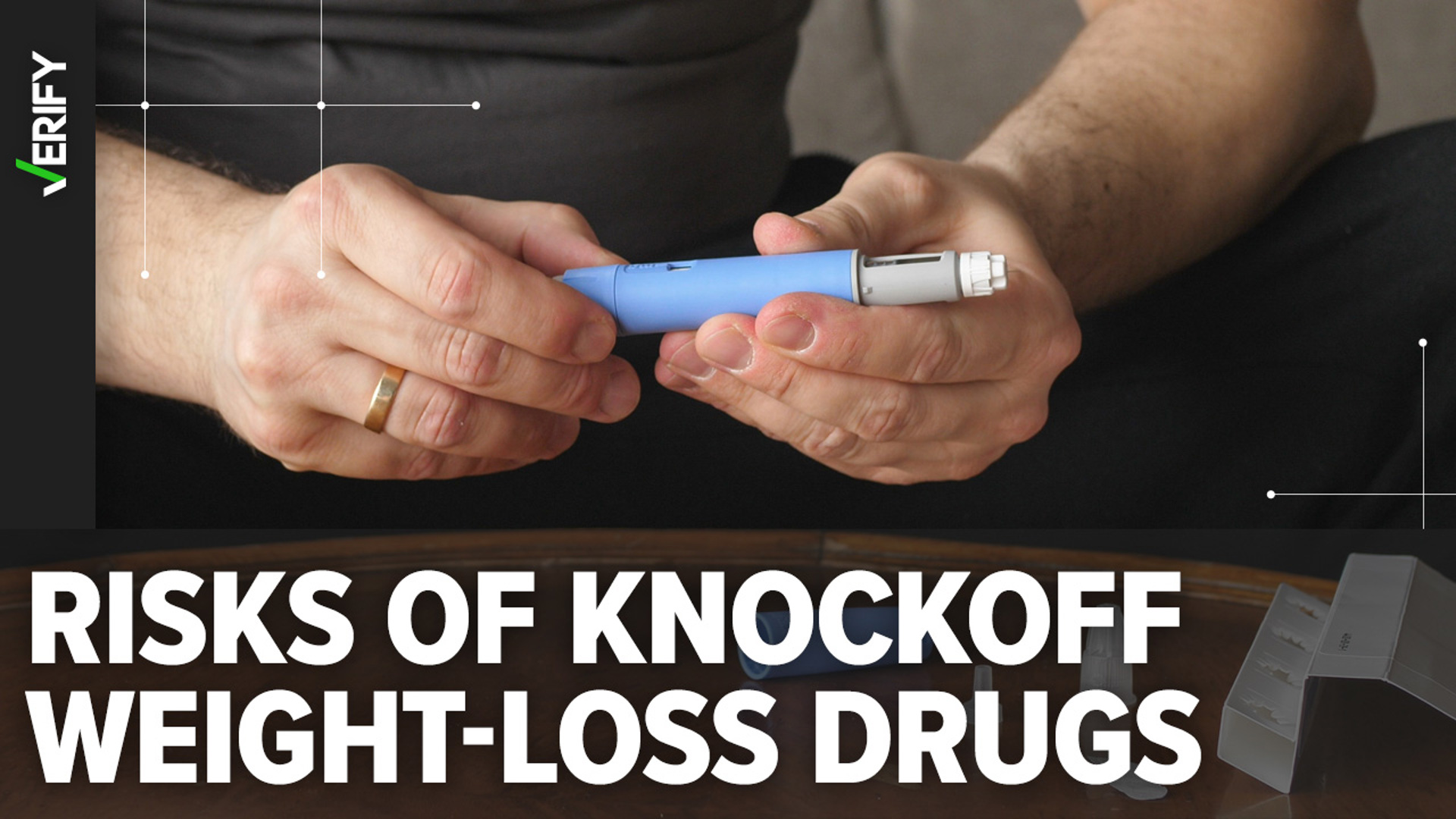Some people who have struggled to lose weight are turning to semaglutide drugs like Ozempic and Wegovy, which have exploded in popularity over the last several years due in part to celebrity testimonials about their effectiveness.
But the drugs are expensive and often difficult to get due to supply problems or because they aren’t covered by insurance.
That’s led some people to look at knockoff weight-loss drugs that are often advertised online. But online searches show many people are wondering if those medications are safe.
THE QUESTION
Are there safety concerns with buying knockoff weight-loss drugs?
THE SOURCES
- U.S. Food and Drug Administration (FDA)
- The World Health Organization (WHO)
- Article published by University of Colorado Health (UCHealth)
- University of New Mexico (UNM) Health Sciences Center Q&A with Joseph Lambson, PharmD, director of the UNM Health Poison Center
- Novo Nordisk, the maker of Ozempic and Wegovy
THE ANSWER
Yes, there are safety concerns with buying knockoff weight-loss drugs.
WHAT WE FOUND
Right now, there are only three semaglutide products that the U.S. Food and Drug Administration (FDA) has approved: Ozempic injection, Rybelsus tablets and the Wegovy injection. All three of these drugs are only available with a prescription and there are no approved generic versions, the FDA says.
If you buy a knockoff weight-loss drug, you could receive either a counterfeit batch or a compounded form of the drug. There are safety concerns in both cases, experts say.
These versions of the drugs are not FDA-approved, which means the federal agency does not verify that they are safe and effective.
Here’s what we can VERIFY about counterfeit and compounded versions of weight-loss drugs.
Counterfeit weight-loss drugs
The U.S. Food and Drug Administration (FDA) and World Health Organization (WHO) have warned consumers about fake versions of popular weight-loss and diabetes medications.
Medical experts with University of Colorado Health (UCHealth) say untrustworthy online sellers are marketing these counterfeit weight-loss drugs.
The WHO issued its warning about counterfeit forms of Ozempic in June 2024 after it confirmed some reports of fake semaglutide, the active ingredient in Wegovy and Ozempic, in the U.S. and other countries.
“These falsified products could have harmful effects to people’s health,” the WHO said.
For example, a counterfeit injection device may have an undeclared active ingredient that could lead to an “unpredictable range of health risks or complications,” the agency said.
In December 2023, the FDA said it had seized thousands of counterfeit units of Ozempic.
The FDA said the needles that came with the counterfeit injectable medication may not have been sterile, presenting an increased risk of infection for patients who used the products. The labeling, packaging and prescription information given to health care professionals and patients was also falsified, the FDA said.
It’s unclear whether the counterfeit drugs that the WHO and FDA found were sold online. But the WHO did recommend against buying medications from “unfamiliar and unverified sources, such as those that may be found online.”
Compounded weight-loss drugs
Some of the websites selling substitute versions of weight-loss drugs send people what is called a “compounded” form of the drug. These websites often work with something called a “compounding pharmacy,” which are usually regulated by states.
Pharmacists and doctors can make compounded drugs by combining, mixing or altering the same active ingredients to make a personalized form of the drug for a patient. In this case, that active ingredient is semaglutide.
But these compounded medications don’t go through the FDA approval process, which means the federal agency does not regulate their safety or effectiveness.
Compounded drugs can serve patients’ specific medical needs. For example, a drug may be compounded for a person who has an allergy to a certain dye and needs a medication to be made without it, the FDA explains.
Compounding pharmacies can also provide these medications in situations where there are drug shortages, Lambson said. Wegovy is currently in short supply due to increased demand for the drug, according to the FDA.
But various medical experts advise against using compounded versions of popular weight-loss drugs because they may not be safe or effective.
The FDA cautioned against using a compounded drug “if an approved drug is available to treat a patient.” Novo Nordisk, the maker of Ozempic and Wegovy, also issued a warning about compounded forms of their drug that may be unsafe.
Cecilia Low Wang, M.D., a UCHealth expert on endocrinology, diabetes and metabolism, said in an article published by UCHealth that it’s “an unnecessary risk” to use compounded versions of weight-loss drugs.
“We strongly recommend against it,” Wang said. “We can’t guarantee their sterility and safety. And if a compounding pharmacy tells you that there’s a certain amount of the active drug in an injection, that can’t be verified independently.”
Some compounders may also be using salt forms of the medication, such as semaglutide sodium and semaglutide acetate, which have different active ingredients from those in the FDA-approved drugs, according to the FDA.
Amy Gutierrez, vice president of pharmacy services for UCHealth, said “products containing these salts have not been shown to be safe and effective.”
“Given the FDA warnings, I would be very concerned with the safety parameters of acquiring semaglutide from a compounding pharmacy,” Gutierrez added.
Joseph Lambson, PharmD, director of the University of New Mexico Health Poison Center, said in a Q&A that he urges people interested in taking semaglutide “to discuss the different options available to them with their medical provider to ensure they know how to take the medication and that they are receiving a drug that uses FDA-approved ingredients.
So, we can VERIFY there are safety concerns associated with using knockoff versions of popular weight-loss drugs. You could receive a counterfeit version of the drug or a compounded form that isn’t necessarily safe or effective.

